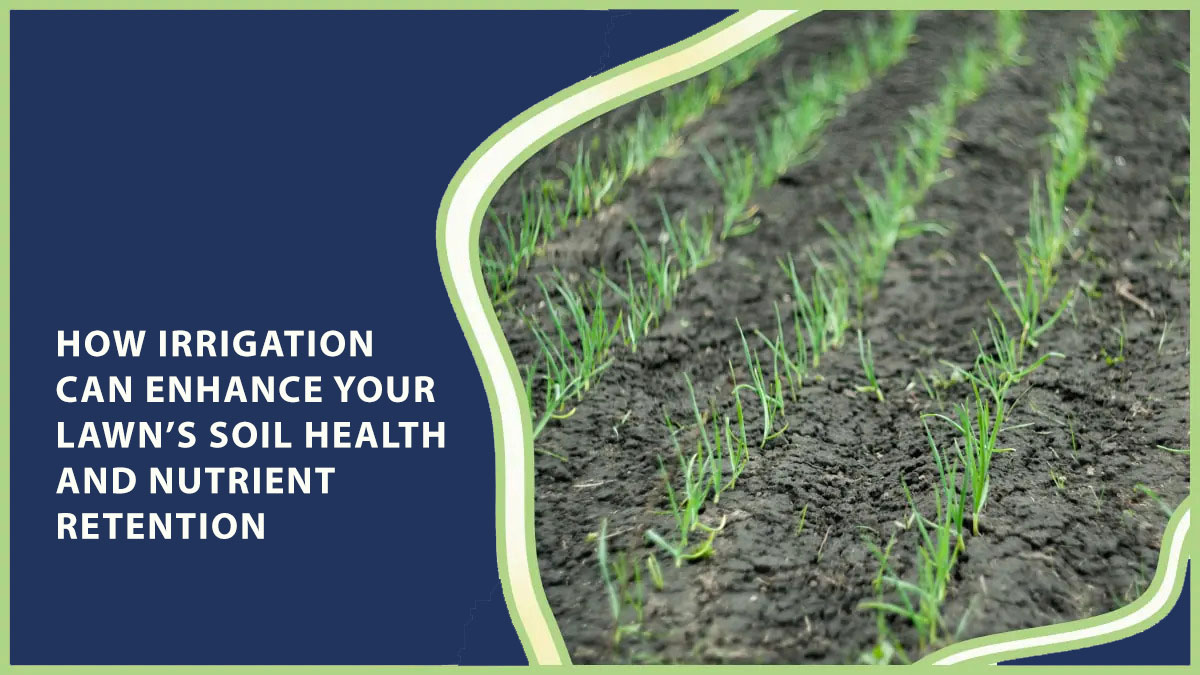Maintaining a healthy and beautiful lawn is a source of pride for many homeowners. And a vital factor in building a wonderfully green lawn is proper irrigation.
In this context, irrigation is the process of applying water to gardens or lawns when rainfall is not adequate for their needs.
The positive impacts of irrigation on soil health and retaining nutrients should not be overlooked. In this post, we discuss the benefits of irrigation on these factors, especially for lawns. We also discuss some of the best practices for maintaining good soil health in irrigated lawn systems.
How Irrigation Can Enhance Your Lawn’s Soil Health and Nutrient Retention

Here are a few benefits of irrigation in maintaining both these aspects of your lawn.
Irrigation Promotes Growth of Plant Roots
Irrigating your lawn helps to promote the growth of plant roots, thereby offering sufficient moisture to the soil.
If the soil is very dry, the roots struggle to absorb nutrients and water. This ultimately stunts the growth and health of plants. Proper irrigation also ensures that soil moisture levels are properly maintained, thus helping the roots grow strong and deep which also supports healthy plant growth.
It Resists Soil Erosion
Irrigation helps to avoid erosion of soil, thereby keeping it highly moist and lessening the harsh impact of rain or wind. For example, if the soil is dry, it is more prone to erosion which also causes loss of nutrients and topsoil. Moreover, irrigation stabilizes soil and prevents its erosion which helps to maintain healthy soil structure and fertility.
It Increases Microbial Activity
This process can increase microbial activity in the soil, which is important to retain nutrients and healthy soil conditions. Various microorganisms like protozoa, fungi, and bacteria play an important role in breaking down organic matter and releasing nutrients in the soil. Moreover, this process offers adequate moisture for these microorganisms to flourish, which also helps to achieve healthy soil.
It Preserves Nutrients in the Soil
Irrigation of your lawn helps to increase nutrient availability, thereby offering the moisture that is essential for nutrient uptake by plants.
If your soil is very dry, essential nutrients are less available to the plants, leading to a deficiency of nutrients and poor plant health. Moreover, irrigation allows you to maintain the soil’s moisture level, which also supports the availability of nutrients to plants.
When soil is too dry, water runs off quickly, taking nutrients with it; this leads to nutrient depletion. Irrigation helps to maintain soil moisture levels, which in turn reduces the risk of nutrient leaching and supports nutrient retention in the soil. (Nutrient leaching is the process of water carrying soluble substances or tiny particles through rock or soil.)
Best Irrigation Methods or Practices to Follow to Maintain Healthy Soil & Nutrient Retention
To maintain healthy soil and nutrient retention in your lawn, it is important to use the right irrigation method and practices. Below are a few essential tips you should follow:
Select the Appropriate Irrigation System
Selecting the right irrigation system is important for maintaining healthy soil as well as nutrient retention. Currently, there are two primary irrigation techniques: drip irrigation and sprinkler irrigation systems.
- Drip Irrigation Method
This method involves applying water to the soil directly through tiny holes in multiple tubes. This method is a great option for smaller lawns and may help to conserve water as well as decrease the loss of nutrients.
- Sprinkler Irrigation Method
The sprinkler irrigation system involves applying water to the lawn through several sprinklers. This is perfect for bigger lawns and allows you to prevent soil erosion and nutrient leaching.
Give Water at the Right Time
Watering your lawn at the right time is essential for maintaining healthy soil and nutrient retention. For example, make sure you apply water to your lawn either in the morning or late in the day when the sun is very low. This reduces evaporation and ensures that water penetrates soil properly.
Apply the Right Amount of Water
Watering the lawn at the right time is important to maintain healthy soil as well as nutrient retention. While overwatering may cause waterlogging and nutrient leaching, underwatering can lead to soil drying out and poor plant health. It is advisable to water the lawn deeply at least once or twice a week.
Fertilize the Lawn
Make sure you select a fertilizer that is right for your lawn type and apply it as per manufacturer’s instructions. This helps offer the nutrients essential for plant growth, healthy soil structure, and nutrient retention.
Test the Soil
Testing the soil occasionally can help to maintain nutrient retention and healthy soil. It helps you recognize nutrient deficiencies as well as soil pH levels, which also may be corrected through proper fertilization and irrigation practices. (Soil pH is the measurement of the alkalinity or acidity of soil by measuring the concentration of hydrogen ions.)
Irrigation plays an important role in maintaining healthy soil and retaining nutrients in your lawn. By selecting the right irrigation technique, watering at the right time, and fertilizing properly, among other methods, you ensure that your lawn remains beautiful and healthy. Proper irrigation practices also help promote root growth, prevent soil erosion, improve soil fertility, increase microbial activity, prevent nutrient leaching, and increase nutrients in the soil. By taking these steps, you can enjoy a lush, green lawn that is the envy of your neighbourhood. To know more about the right lawn irrigation system, contact Green Valley Irrigation.

